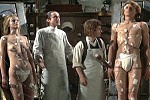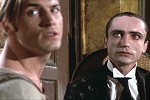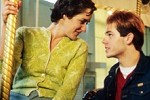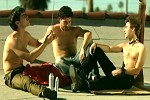 SHADOWS ON THE TUBE
SHADOWS ON THE TUBEEDGE OF SEVENTEEN | FAQS
< < M O R E | M O R E > >
last update 4.May.06
If you have an film you want me to review - just ASK
 R E V I E W B Y R I C H C L I N E
R E V I E W B Y R I C H C L I N E
 After the Flesh/Trash/Heat trilogy, Warhol, Morrissey and Dallesandro turn their attention to a pair of gothic classics. This first effort isn't very good, but you've got to see it.
After the Flesh/Trash/Heat trilogy, Warhol, Morrissey and Dallesandro turn their attention to a pair of gothic classics. This first effort isn't very good, but you've got to see it.
Things are a bit twisted at Frankenstein castle. There's the mad-eyed Baron (a very young Kier), his cranky, sex-starved wife/sister (van Vooren) and their two sneaky, sadistic kids (Elmi and Liofredi). The Baron's collecting body parts with his faithful assistant (Juerging) to create a monster and his bride, and thus the perfect human race. Meanwhile, the Baroness is finding some, ahem, personal projects for the lusty stableboy (Dallesandro), whose lovelorn best friend (Zelenovic) is about to donate his head to the Baron's project.
Yes, there are moments that remind us more of Young Frankenstein than the Mary Shelley classic. But then Morrissey is definitely playing up the satire, while also focussing on his story's more haunting elements--most notably all the miss-placed love and the eerie Nazi parallels. You can tell that Morrissey was going for something classy here; his direction is slick and inventive, and he indulges in lots of elegant pans, a creepy orchestral score and even a commercial focus on gore rather than sex.
It's filmed in Italy in that cheesy 70s Euro-trash style--bleached-out colours, under-populated sets, clumsy accents, terrible effects, a cast of porn stars ready to rip their clothes off. And the seriously silly plot screams for a much more camp and energetic filmmaking style. There are continual lusty glances, a strong Lady Chatterley subtext, hilarious ironies (the creepy kids are terrified of mice and bats) and gruesome fetishism (the Baron's obsession with his female monster's entrails).
As it is, it's a comedy that's strangely played straight. At least the strained, arch performances work to establish the tone. Some scenes are overly talky, others horribly clunky. But it's so jaw-droppingly unhinged that you have to love it.
with Joe Dallesandro, Udo Kier, Monique van Vooren, Arno Juerging, Srdjan Zelenovic, Dalila Di Lazzaro, Nicoletta Elmi, Marco Liofredi, Liu Bosisio, Fiorella Masselli, Rosita Torosh, Cristina Gaioni
 release US 17.Mar.74,
release US 17.Mar.74,UK 22.May.06 dvd
73/Italy 1h35
2.May.06
 R E V I E W B Y R I C H C L I N E
R E V I E W B Y R I C H C L I N E
 Warhol, Morrissey and Dallesandro follow their unhinged Frankenstein with this even more stylishly deranged Dracula flick. It's a funny, engaging gothic thriller with a surprising emotional undercurrent.
Warhol, Morrissey and Dallesandro follow their unhinged Frankenstein with this even more stylishly deranged Dracula flick. It's a funny, engaging gothic thriller with a surprising emotional undercurrent.
Count Dracula (Kier) must leave his Romanian castle and head to Italy, a Catholic country, because he needs virgin blood to survive. With his faithful assistant (Juerging), he settles in the home of the Marchese and Marchesa Di Fiore (De Sica and McKendry) and their four daughters. But the two most eligible girls (Darel and Casini) are enjoying raucous romps with the handyman (Dallesandro) ... and each other. While the eldest daughter (Vukotic) has sworn off men, and the youngest (Dionisio) is only 14.
Morrissey is clearly having fun as he wallows in his story's icky elements. Non-virginal blood is poison to the Count, so the dark, eerie, sexy Kier is really put through the wringer. And as the focus shifts to the "real sweet" youngest girl, the solution seems hilariously obvious. Morrissey combines this comical narrative with witty direction and blood-soaked carnage.
His sense of production design is inventive and sharp--he makes terrific use of his cast and locations. Still, it feels rambling and indulgent at times, as some scenes drag on (how long can the Count vomit that bad blood?). But as it gets increasingly crazed it also gets more and more entertaining.
For such a nutty film, the performances are surprisingly good--edgy and lively, playing the comedy dead straight and tapping into the tenderness underneath, despite their random accents. And the script is loaded with clever touches, most notably the Pride & Prejudice parallels as the family tries to foist a daughter on the rich Count.
There are also frequent hilarious bits. "He's deadly pale," observes one daughter, "and of course all vegetarians look like that." The girls' oblivious hedonism is very funny, as are the script's sharp jabs at the class structure. "The lower classes were born to work so us upper classes can have a good time." Indeed.
with Joe Dallesandro, Udo Kier, Arno Juerging, Vittorio De Sica, Maxime McKendry, Dominique Darel, Stefania Casini, Milena Vukotic, Silvia Dionisio, Gil Cagnie, Eleonora Zani, Roman Polanski
 release US 27.Nov.74,
release US 27.Nov.74,UK 22.May.06 dvd
74/Italy 1h43
2.May.06
 R E V I E W B Y R I C H C L I N E
R E V I E W B Y R I C H C L I N E
 A strong sense of reality helps ground this lively, colourful coming-of-age story set in 1984 Middle America, a time period that allows for lots of hilarious hair-dos, wacky clothes and superb music.
A strong sense of reality helps ground this lively, colourful coming-of-age story set in 1984 Middle America, a time period that allows for lots of hilarious hair-dos, wacky clothes and superb music.
Eric (Stafford) is a teen in his first job at a barbecue buffet in Sandusky, Ohio. It's his first step away from his family, and he's beginning to discover things about himself that his family and friends can't help him with. His best pal Maggie (Holmes) clearly has a crush on him, which he tries to reciprocate. But he's more attracted to the flirty frat-boy coworker (Gabrych) who's returning to university. Eric is going to have to come to terms with who he is before anyone else can.
Sure, everyone goes through this process in one way or another, and writer Stephens mined this exact same material three years later in his 2001 directorial debut Gypsy 83. But there's enough here to keep us engaged with characters who are genuinely trying to solve the mysteries of their own selves before trying to figure out the world around them. And placing it in the 1980s, with a vivid soundtrack and costumes straight from Miami Vice or Wham, gives it a rather ridiculous but vibrant sharpness.
The filmmakers also manage to maintain a relaxed, natural tone. Solid work by the cast helps; Stafford and Holmes have particularly good chemistry, especially in a few extremely emotional scenes. And it's these moments of serious introspection that give what's essentially a comedy some badly needed weight. Clever subtext flows through every scene, as does an honest sexuality that leads to both good and bad discoveries. The film addresses awkward situations head on--in such a way that we know the writer has actually lived this story. Probably wearing these same awful clothes and hairstyles. Although a Bronski Beat revival wouldn't go amiss.
scr Todd Stephens
with Chris Stafford, Tina Holmes, Andersen Gabrych, Stephanie McVay Lea DeLaria, John Eby, Antonio Carriero, Jason Scheingross, Tony Maietta, Jeff Fryer, Kevin Joseph Kelly, Mark Gates

release US 11.Jun.99,
UK 23.Sep.05 dvd
98/US 1h39
20.Sep.05
 R E V I E W B Y R I C H C L I N E
R E V I E W B Y R I C H C L I N E
 As with Luster, Lewis' authentic tone, engaging cast and strong use of settings just about make up for his over-serious scripting. Even if he has a point, it's too much.
As with Luster, Lewis' authentic tone, engaging cast and strong use of settings just about make up for his over-serious scripting. Even if he has a point, it's too much.
India (Lia) is young and cute and living on the mean streets of L.A., prey to pornographers, pimps and homophobic thugs. Rescued by the gun-toting drag queen Destiny (Louis), he forms a family with "brother" Lester (Vier), adopting a street artist (Davis) and a former-basher (Larson) and embarking on a rampage of vengeance that threatens to turn into death and destruction.
The film opens with the shocking text of the 2004 Texas Republican Party manifesto, encouraging discrimination and violence toward homosexuals. So we know what Lewis' political statement is. And he has a strong, positive response from the gay community: "Our kisses are louder than bombs; let's go blow 'em away." Unfortunately he can't resist stating it in increasingly obvious and melodramatic ways.
At least the cast is likeable--young unknowns who create a believable family group, slowly warming to and then relying on each other. There's a realistically lusty tone to their interaction, even though the corny dialog often defeats them, and the film's structure leaves strong scenes feeling jagged and unfinished. Still, their situations are so compelling that we find ourselves involved in each character's journey.
The strongest aspect is the film's edgy confrontation of rampant homophobia. Yes, it's over the top--everyone is full of hate, and even the gay characters are obsessed with violence and gunplay. Despite the fake epiphanies and simplistic explanations that dot the film, there is some important truth here. Lewis examines these things in a fairly shallow way, and as the plot starts to build into a series of Western-style, life-threatening showdowns, we know his real message is that love conquers all ("Put down the gun; violence is for straights"). We keep waiting for England Dan and John Ford Coley to swell up on the soundtrack, singing that love is the answer. Like Luster, Lewis simply can't settle for telling a story--he has to preach.
with Joe Lia, Allan Louis, Lance Lee Davis, Adam Larson, Minerva Vier, Vince Parenti, Josh Paul, Arthur Roberts, Thomas Magazeno, Brian Endress-Fox, Justin Meloni, Tera Nova

release UK 3.Oct.05 dvd; US 3.Feb.06
05/US Peccadillo 1h27
2.Oct.05


© 2006 by Rich Cline, Shadows on the Wall
HOME | REVIEWS | NEWS | FESTIVAL | AWARDS | Q&A | ABOUT | TALKBACK